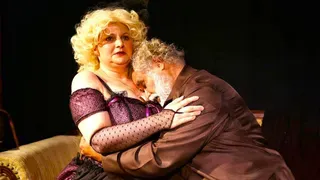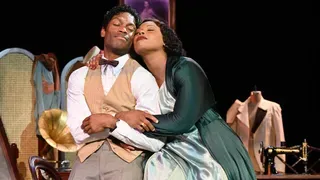September 30, 2010
Anita Bryant Died for Your Sins
Kevin Mark Kline READ TIME: 3 MIN.
Anita Bryant Died for Your Sins is not your typical teenage coming-out story, for reasons only partially related to its provocative title. Horace Poore, the central character, doesn't stand up to bullies, find romance with his school's closeted star jock, or cleave himself from a bigoted family. Instead, his conflicts are reflected off the bad-news decade of the 1970s that provides him with ongoing reasons to keep his sexual identity hidden. Among the news stories jamming his closet door is beauty queen/singer/orange juice spokeswoman Anita Bryant's campaign to overturn an anti-gay discrimination law in Florida's Dade County, far away from his rural home in the Adirondacks, but a story that went a 1970s version of viral.
New Conservatory Theatre Center is presenting the San Francisco premiere of Brian Christopher Williams' thoughtful comedy in a handsome, well-acted production directed by Dennis Lickteig. It has more than a passing resemblance to Neil Simon's Brighton Beach plays, as an aspiring young writer with a preternatural cleverness narrates episodes of life with his parents and brother, who seem to him, at times, of a different species.
With help from a Walter Cronkite stand-in, we get a crash course on the 1970s, including the start of the Selective Service's lottery draft, which threatens Horace's brother with near-certain deployment to Vietnam, the 1972 Munich Olympics, producing Horace's first man-crush in Mark Spitz and a massacre of Israeli athletes, Watergate, gas-rationing, inflation, the Bicentennial, and, ta-dah, Anita Bryant. "She is trampling out the vintage in her sensible Christian shoes," Horace observes.
The playwright steers refreshingly clear of stereotypes as he paints his characters, with Horace's parents very much defying expectations despite a Yankee redneck aura. Horace's mother, for example, tries to answer her young son's theological questions with sincerity until he finally stumps her with a question about a mentally challenged neighbor. "Some of God's decisions," she says, "are goddamn practical jokes."
Horace's safe place is his treehouse (part of Kuo-Hao Lo's impressive set design), where he writes a journal, listens to a transistor radio, and ruminates aloud on these stirrings that he finally finds has a name: homosexuality. His crush on Mark Spitz gets transferred to his be-mustached gym coach, whose feelings may or may not be reciprocal. That relationship takes a peculiar turn in the second act, which can get tangled up in the playwright's urge to write in florid speechifying rather than the sharp dialogue that has come before. "Sex is a beautiful rainbow and most people are colorblind," is an abbreviated part of the coach's sermon to Horace. And when Horace turns against the coach, he proclaims, "I have betrayed the one who now carries my heart on the wind."
But most can be forgiven thanks to the actors playing the Poore family. Michael Doppe is making his SF acting debut as young Horace, and it is a believable, graceful performance that solidly nails the laugh lines when they arise. As his no-nonsense mother, Marie O'Connell becomes a force of nature as she creates a character both unnerving and totally lovable. Harry Breaux is the gruff dad, a part he expertly plays with surprising nuances. Justin Dupuis has the right shambling countenance as Horace's draft-dodging older brother.
Versatile and able work is provided by Jeffrey Biddle as various characters (including Walter Cronkite and oleaginous preachers), and by Lauren Rose, who makes multiple appearances as Anita Bryant as well as one of Horace's school chums. And Mary Kidwell nicely handles the role of the mentally challenged neighbor. In the important role of the macho coach, Cory Tallman seems a bit miscast, both in physical appearance and demeanor. He offers to help Horace bulk up, a service he might first provide to himself.
Anita Bryant Died for Your Sins will run at New Conservatory Theatre Center through Oct. 24. Tickets are $24-$40. Call 862-8972 or go the www.nctcsf.org.







